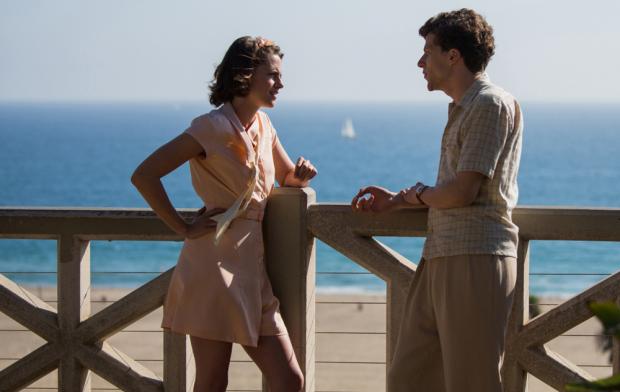Boy Meets Girl and Jewish Angst: Café Society
By its last strikingly composed and lit shot, Woody Allen’s Café Society seems to be trying to resolve itself into a dramatization of the lesson of “wise men” in one of Cole Porter’s song lyrics: “Love’s young dream never comes true.” It can be hard to discern along the movie’s busy, tonally uncertain way, but Allen was aiming for an uncharacteristic note of rueful poignance. Yet for much its length—it’s only an hour and one-half long, but seems longer—this one comes across comedically, even if it’s not particularly funny.
At the center of Café Society is Bobby Dorfman (Jesse Eisenberg), a New York youngster in the 1930s who travels to LA in hopes that his Uncle Phil (Steve Carell), a big-time Hollywood agent, will help him find his fortune, or at least to escape from his stifling existence with his Bronx Jewish family. Phil, a seriously self-promotional operator, greets his nephew, after a protracted delay, with an exaggerated surprise and preoccupation, but affects a spur-of-the-moment generosity, hiring him as one of his agency’s gofers, if a slightly privileged one. And he directs one of his assistants to show the kid around town. Bobby is duly smitten with the slimly attractive and calmly intelligent Vonnie (Kristen Stewart), and she allows him a place in her busy life, even offering to cook him a spaghetti dinner. But when he makes his awkward move, she tells him she has a lover, an older man. (Any guesses?)
Bobby is a tightly wound, anxiously conciliatory, verbally overactive young man. In other words, he’s a knockoff of a number of Allen’s earlier protagonists. (Am I the only one who perceives some tendency of Allen’s leading men to mimic his performance ticks and tricks?) Bobby is something like a self-conscious, nervously striving Candide. Eisenberg can do this kind of thing better than most actors and he just about manages to make it believable. Vonnie has a little more warp and woof than most of Allen’s female characters. Stewart is a careful, convincing actress, but she’s contending with a role that’s rather arbitrarily conflicted: a young woman who’s subject to the actions of two contending males. The most convincing performance is Carell’s. His Phil is inveterately self-justifying, a practiced maneuverer, but not entirely a creep.
Café Society suffers from a curious emotional flatness even as it struggles toward a sense of romantic yearning. It’s tonally indecisive, a comedy without much that’s really amusing. (There’s an oddly unfunny running gag about Bobby’s older brother, a brutal gangster.)
Allen has long been focused on themes of nostalgia and worldly cynicism. (Even The Purple Rose of Cairo, fondly remembered by many, is rather bleak.) Café Society fits into this mode. There’s his deep affection for old pop-jazz songs and bygone show business and the faintly derisive Jewish shtick. There are also brief reprises of the gloomy, tinny moral pondering of Crimes and Misdemeanors and Allen’s obvious preference for a long-vanished, probably never-was Manhattan over California.
Café Society looks better than many of Allen’s movies, chiefly because of Vittorio Storaro’s gilded-to-amber-toned photography and Allen’s somewhat more imaginative use of the camera. But the movie remains a sort of overstuffed cinematic fruitcake, uneven and mostly uninvolving.

